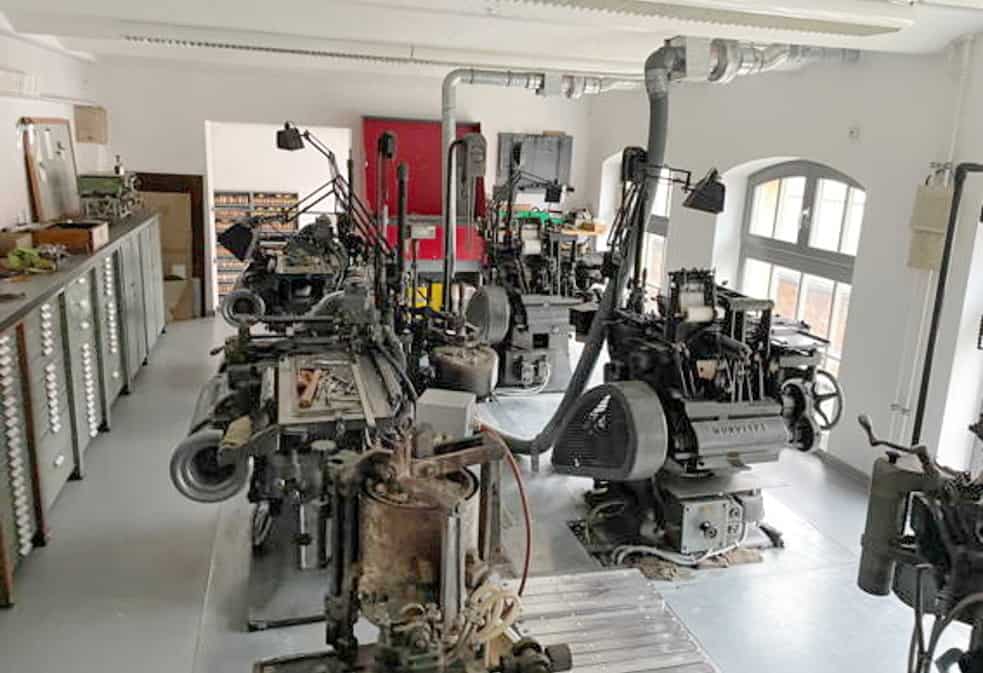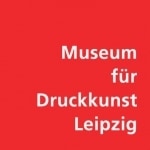
The Monotype foundry of the Offizin Haag-Drugulin in Dresden (Photo: Museum für Druckkunst Leipzig)
The Leipzig Museum für Druckkunst is taking over the unique collection of historical printed matter, type matrices and machines of the Offizin Haag-Drugulin printing workshop which closed down at the beginning of the year, following the death of its owner, Professor Eckehart SchumacherGebler, who was regarded as one of the world’s most renowned print historians and collectors. In February the workshop was placed under a preservation order. Thanks to the successful cooperation between the heirs of Eckehart SchumacherGebler, the Saxony State Office for the Preservation of Monuments, the Dresden Office for Culture and Heritage Preservation and the Stiftung Werkstattmuseum für Druckkunst, a solution has been found for the long-term preservation by the Leipzig museum of a major collection of industrial cultural value.
Christian Schumacher-Gebler, representative of the community of heirs, explained that the merging of the essential parts of the collection with the museum in Leipzig, which his father founded in 1994, fulfils his wish to preserve this cultural asset: ‘Our father devoted his entire life to the preservation of the traditional art of printing. He wanted to preserve his irreplaceable cultural treasures for posterity and make them accessible. The museum in Leipzig is the appropriate place for this’.
With the acquisition of the collection, the Museum für Druckkunst is gaining over 150 different type fonts, including the last surviving letters of the Reichsdruckerei, including valuable decorative letters and ornaments. Also more than two million rare casting matrices from the Monotype company, which revolutionised machine typesetting at the end of the 19th century. For a large part of the collection, the move to Leipzig means a return to its place of origin: the holdings of the former Leipzig Offizin Haag-Drugulin, renamed Offizin Martin Andersen Nexö in 1954, are returning after more than 10 years to Nonnenstraße 38 in Leipzig Plagwitz, to what is now the Museum für Druckkunst. They thus complete the collection and further strengthen the museum’s reputation as a workshop for actively experiencing traditional printing techniques.
Katharina Walter, director of the Museum für Druckkunst since February, is delighted that it has been possible to save the centuries-old type treasures and casting machines after it was no longer possible to continue operating the printing workshop in Dresden for economic reasons. The museum team now has the considerable task of storing these pieces in a way that will make them suitable for preservation by the end of August. The increase in the collection is a gain for the museum and the city of Leipzig, which can look back on a long history as a printing and book- publishing centre. For this reason, Leipzig’s mayor, Burkhard Jung, supported this solution from the very beginning.
The transfer of the collection, which has now been agreed, came about with the active participation and mediation of the responsible heritage authorities, the Saxon State Office for the Preservation of Monuments and the Dresden Office for Culture and Heritage Preservation. Both authorities worked intensively with the owner and the museum on the evaluation of the collection from a heritage point of view and have declared their consent to the transfer of ownership and the retention of the collection in Leipzig within an agreement.
The head of the Dresden Office for Culture and Heritage Preservation, Dr. David Klein, is relieved that a solution was found in the shortest possible time that fundamentally secures the preservation of this unique cultural monument.
Contact
 Katharina Walter
Katharina Walter
Tel.: +49 341/2 31 62-21
Fax: +49 341/2 31 62-20
katharina.walter@druckkunst-museum.de
presse@druckkunst-museum.de